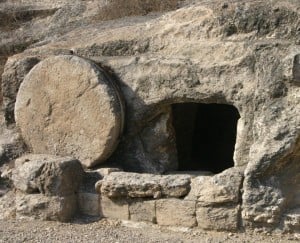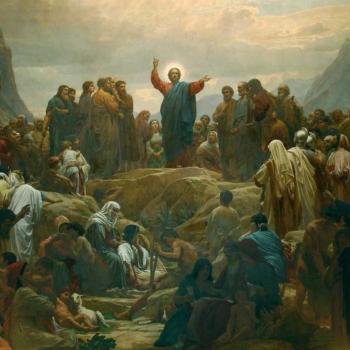As part of Patheos’s Easter coverage, we’re imagining what it would be like to witness the Resurrection. This is my contribution. For more ‘accounts’ and other resources for Holy Week, visit the Patheos Engaging Easter page here.
—
 Do you ever think to yourself, “It would have been incredible–better!–if I could’ve been there to see the resurrected Christ”? Be careful–you might hear Lee Corso screaming in your ear.
Do you ever think to yourself, “It would have been incredible–better!–if I could’ve been there to see the resurrected Christ”? Be careful–you might hear Lee Corso screaming in your ear.
In John 20, we see the final act of the Gospel of John. Here, Peter and John get word that Jesus’s tomb is empty and they rush to see it, assumedly stunned at the report:
Peter went out with the other disciple, and they were going toward the tomb. Both of them were running together, but the other disciple outran Peter and reached the tomb first. And stooping to look in, he saw the linen cloths lying there, but he did not go in. Then Simon Peter came, following him, and went into the tomb. He saw the linen cloths lying there,and the face cloth, which had been on Jesus‘ head, not lying with the linen cloths but folded up in a place by itself. Then the other disciple, who had reached the tomb first, also went in, and he saw and believed; for as yet they did not understand the Scripture, that he must rise from the dead. Then the disciples went back to their homes. (John 20:3-10)
It’s easy for us to wag our fingers at Jesus’s disciples, wondering how they could spend three years with their long-awaited Messiah, God in the flesh, and either not notice his true identity or simply push the fact aside when things got hard. We say, “Man! I’d give anything to be in their shoes!” We think that Peter’s denial of Jesus, for example, is something we could’ve never done had we reclined at the same table with him for years.
Easy Belief?
Imagine for a moment that (Lord forbid!) your best friend is brutally murdered. You watch it happen, you attend his funeral. You literally watch your friend lowered into the ground. Now imagine that three days later you arrive at the grave site and there’s a huge hole in the ground, the coffin is wide open, and no one is inside. Like Peter and John, you’d believe that he wasn’t there anymore. That’s easy.
But would you have believed your friend if he’d predicted it before it happened? Of course not! You might call Dr. Phil to intervene. (Of course, he’d probably say something like, “You gotta give what you get to receive what you have.” Then everyone would be confused.)
We have the benefit of hindsight. We read the Resurrection account and see the stories of witnesses. We confess the truth of his resurrection from a place of privilege. Peter and John spent a few years in Jesus’s inner circle. Yes, they saw miracles and astounding prophecies, and they were there at the Transfiguration. They also knew the prophecies about the Messiah from their Scriptures. But none of this guaranteed that he’d come back from the dead. No one does that!
And yet he did. He didn’t leave them–or us–at an empty tomb. He promised he wouldn’t.
Resurrection Power and Promise
As my friend Jeff Medders says, “Jesus wasn’t reduced to bone dust.” Peter and John went back to their homes, surely confused by the whole ordeal. Was his body stolen? Did we show up at the wrong tomb somehow?
The rest of the chapter shows the disciples locked away in a house “for fear of the Jews.” They’re scared for their lives for being associated with Jesus… and then his tomb is now empty? Imagine the exhausting emotional toll that is taking on them. It sounds like a low-budget horror flick.
But Jesus appears in the room with them! He comes to give them the Holy Spirit, to give them rest and assurance that he did not abandon them, even in death. And it appears that only seeing the wounds in his hands and side (as it is with Thomas shortly after) led them to believe that it really was Jesus himself.
He then does something crucial to the scene: Jesus gives them the Holy Spirit; he gives them actual resurrection life through the third Person of the Trinity. This is why John writes the Gospel, including this story: “These are written so that you may believe that Jesus is the Christ, the Son of God, and that by believing you may have life in his name.” He came to life, then gave them life, to give us life.
These doubting (or at least confused) disciples are often treated as antagonists in this story, but the truth is, we would have been no different. The disciples might’ve wished they could have our hindsight, while we wish we had their personal encounter. But Jesus tells them at the end of the chapter, “Have you believed because you have seen me? Blessed are those who have not seen and yet have believed.” We, the ones who didn’t spend three years traveling with Jesus, are the blessed ones.
We are blessed beyond his disciples because we believe without sight. Instead of wishing that we had something he chose not to give us, may we hold tight to the promise he did give us: death didn’t defeat him, and he won’t be gone forever. He’s coming back. He promised.
Ask his disciples: he never breaks a promise.











